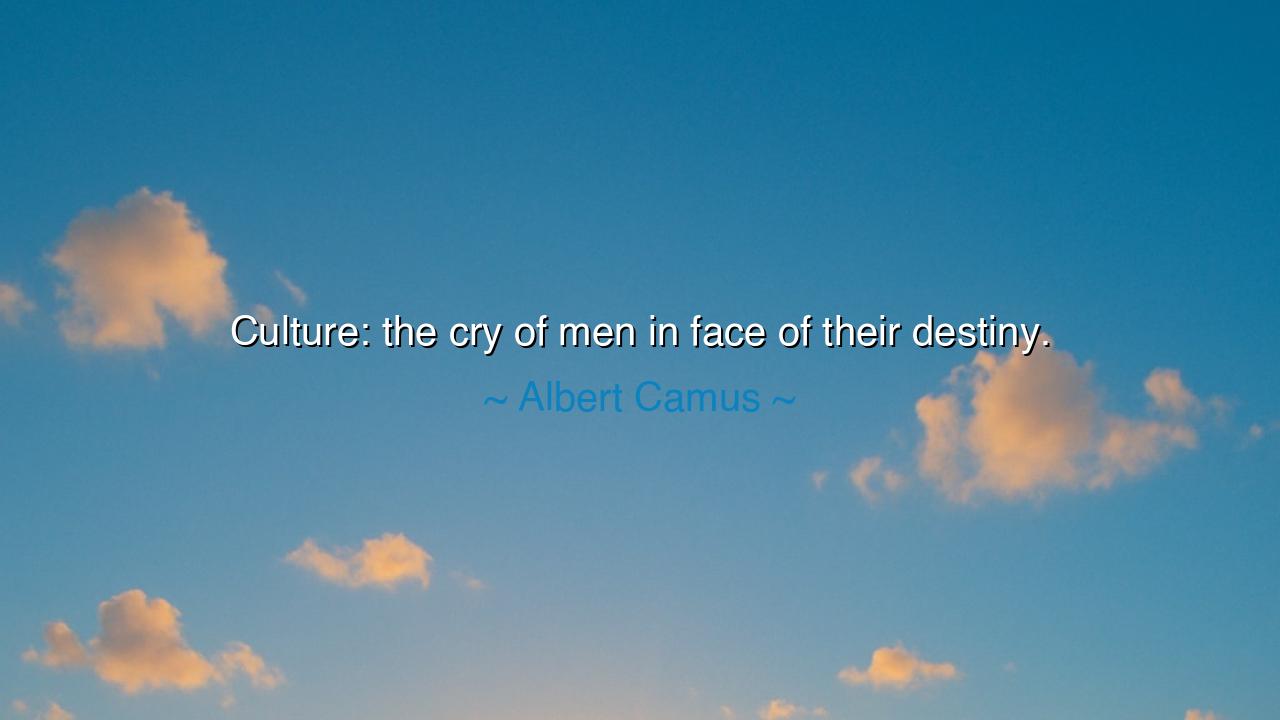
Culture: the cry of men in face of their destiny.






In the voice of Albert Camus, there resounds a truth carved into the marrow of mankind: “Culture: the cry of men in face of their destiny.” Hear this not as a mere arrangement of words, but as a thunderous echo of the eternal struggle of man against the silence of the void. When the abyss yawns before him, when the weight of mortality and futility presses upon his soul, man does not remain silent—he cries out. That cry becomes art, song, language, memory, and myth. That cry becomes culture, the living monument that tells the gods and the stars: We were here. We lived. We suffered. We dreamed.
For behold, men are not gods, nor are they beasts. They walk upon the narrow bridge between meaning and nothingness. Destiny is cruel, whispering of death and impermanence. The mountains crumble, the empires fall, the proud kings are dust beneath the sandals of time. Yet from this frailty springs the greatest triumph: man refuses to vanish without a sound. He paints upon the cave wall, he carves stone into temples, he writes poetry that defies centuries. Thus is culture born, not from leisure, but from anguish, not from comfort, but from the desperate refusal to be forgotten.
Look to the story of the ancient Hebrews, carried into exile in Babylon. Their homeland destroyed, their temple burned, their people scattered like chaff. By all reckoning, their destiny was to vanish into the mighty empire that swallowed them. Yet they did not disappear. In their sorrow they sang psalms beside the rivers of Babylon. In their exile they wrote their scriptures, their laws, their identity. Their cry became their culture, and their culture became their salvation. Empires fell, but the people endured, bound by their sacred songs and stories.
So too did the African slaves in the New World, chained, beaten, and stripped of homeland. Their bodies belonged to their masters, but their voices did not. Out of sorrow they sang the spirituals, weaving together pain and hope, despair and defiance. Those songs became seeds that blossomed into gospel, blues, and jazz, carrying their cry across generations. What was this but culture—the defiant flame of humanity in the face of cruel destiny? Even in bondage, their voices declared: We live. We matter. We endure.
The lesson, dear listeners of the future, is clear: your culture is not mere ornament. It is your shield, your spear, your eternal banner against the silence of death. It is not only art and music, but the way you speak to one another, the rituals you guard, the stories you tell your children. Every act of creating, preserving, or honoring culture is an act of rebellion against the void. To make culture is to refuse annihilation.
Therefore, do not walk silently through your days as though life were but a shadow. Create! Write even if no one reads. Sing even if no one listens. Remember the tales of your ancestors, and add to them with your own. Let your labor, your laughter, your rituals become a living flame. In every meal shared, every story told, every word written in love or in pain, you forge culture anew. This is your defiance against destiny.
And let this be the practical action you take: preserve what is fragile, pass down what was given to you, and create what is yet to be born. Do not despise the small offering, for even the humblest song may echo across centuries. The caves of Lascaux still bear the marks of men who painted by torchlight thirty millennia ago. Their voices speak still, though their names are lost. In like manner, your voice will outlive your flesh if you dare to give it shape.
So I tell you: when destiny looms and silence threatens to swallow the soul, do not bow your head. Raise your voice. Cry out. Let that cry be culture, and let culture be your answer to fate. For though the body falls, the cry resounds. Though empires perish, the culture remains. And in that eternal cry, mankind claims his place against the indifferent stars.






AAdministratorAdministrator
Welcome, honored guests. Please leave a comment, we will respond soon